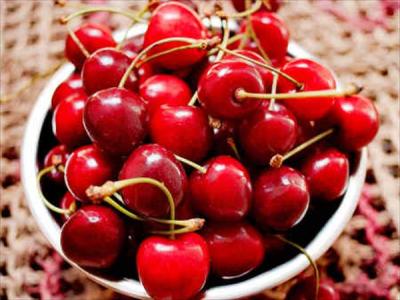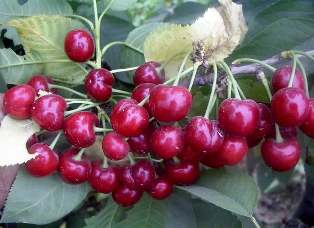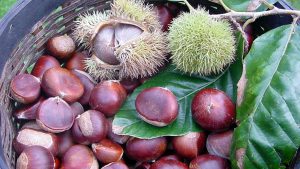Description
Cherries may be either deliciously sweet and deep brown-red or quite tart and bright red. The two most common are the sweet cherry, Prunus avium L., and the sour (often referred to by growers as the pie or tart) cherry Prunus cerasus L.. Sour cherries have a lower sugar content and a higher acid content than their sweet counterpart. Not surprisingly, sour cherries are slightly less caloric than sweet cherries, containing about 60 calories per 3.5 oz (100 g) portion compared to 80 calories for sweet. Cherries are high in vitamin C, carbohydrates, and water, and include trace amounts of fiber, protein, vitamin A, vitamin B1 (thiamin), vitamin B2 (riboflavin), niacin, calcium, phosphorus, iron, and potassium.
Cherries are found in the wild and have been domesticated for centuries. There is a myriad of cherry types, resulting from new varieties and hybrids developed for hardiness and flavor. This fruit is found in Asia, Europe, and North America, with Iran, Turkey, the United States, Germany, and Italy leading in the production of cherries. Together, 10 countries produce over 1.1 million short tons (over one million metric tons) of cherries annually.
Health Benefits of Cherry Fruit
Tiny, juicy, and very tasty, we often come across this fruit in desserts, cakes, ice creams, tarts, and muffins. A typical cherry is a fleshy drupe (stone fruit) belonging to the genus prunus, which also includes fruits like plums, peaches, and apricots. Prunus avium is the name given to wild cherry as well as the cherry tree. A typical cherry has a stony hard seed in the center surrounded by edible fleshy fruit measuring around 2 cm in diameter. It has very thin skin which is bright and shiny red or purple in color. Cherries generally fall into two categories- wild or sweet cherry and sour or tart cherry. Sweet cherries belong to the species Prunus avium while the tart variety belongs to the species Prunus cerasus.
Cherries are a chef’s favorite as they can be used in a variety of recipes, making the dishes more attractive and delectable. Cherry extracts are often added to beverages and processed foods to impart flavor. Delicious, and loaded with nutrients, particularly Vitamin C and beta-carotene, cherries are definitely the choice if you are looking for a great combination of taste and health.
Cherries offer the following health benefits.
Relieves Arthritis Pain
The presence of excess uric acid in the blood can lead to intense pain, swelling, tenderness, and inflammation associated with arthritis and gout. The two powerful compounds in tart cherries, anthocyanins, and bioflavonoids slow down the enzymes Cyclo-oxyygenase -1 and -2, thus preventing and relieving pain caused during arthritis and gout as well as the effects of osteoarthritis and rheumatoid arthritis. This is because it helps to dissolve the crystals of urate which can be formed around the joints and the kidneys. According to research conducted by the Human Nutrition Research Center at the University of California, women consuming 280 grams of tart cherries showed 15% lower levels of uric acid.
Anti-cancer Properties
These properties can be attributed to the presence of flavonoids that impart the deep red color to cherries and powerful antioxidants that fight the free radicals in the body. Cyanidin is one such flavonoid from the anthocyanin group that prevents cancer cells from growing out of control. They are also rich in quercetin which is regarded as one of the most potent anticancer agents. Ellagic acid is a naturally occurring plant phenolic known for its anti-carcinogenic/anti-mutagenic properties. Cherries also contain an extremely powerful compound called perillyl alcohol (POH) which is effective in reducing the occurrence of all types of cancer. The combination of these compounds makes cherries a great anti-cancer agent.
Promotes Peaceful Sleep
Bad sleep patterns are largely caused due to unbalanced hormones, excess stress, and unhealthy habits. Tart cherries contain melatonin, a hormone that induces peaceful sleep. Taking two tablespoons of tart cherry juice before going to bed is as effective as a melatonin supplement in promoting good sleep.
Cardiovascular Benefits
Research conducted by the University of Michigan Health System indicated that the cardiovascular benefits provided by cherries are comparable to those of some medications. This is because the anthocyanins which impart the red color to tart cherries activate PPAR in bodily tissues, which regulates fat and glucose, thus preventing high cholesterol, blood pressure, and diabetes. A cherry enriched diet can greatly reduce the risk of heart disease by lowering cholesterol and easing inflammation.
Lowers Blood Pressure
Cherries are an excellent source of potassium which plays an important role in lowering blood pressure by getting rid of excess sodium in the body. Consumption of cherries helps in maintaining the balance of potassium and sodium, thus preventing hypertension. A cup of cherries has the same amount of potassium as a banana which makes it a great substitute for banana.
Aids Weight Loss
Cherries are low in calories and fat and they mainly comprise of water. Thus, eating cherries can help you lose weight, particularly belly fat. A cup of cherries contains less than 100 calories and 3 grams of fiber, which can keep you full for longer. They also contain B vitamins like thiamin, riboflavin, and Vitamin B6 which are vital for metabolism and conversion of nutrients into energy. High water content increases energy levels and speeds up metabolism. Thus, cherry for weight loss is very beneficial.
Relieves Migraines
The anthocyanins and bioflavonoids present in cherries help relieve headaches and migraines by reducing inflammation in the body. The effect of these compounds is comparable to that of aspirin and ibuprofen.
Aids Muscle Recovery
Consumption of a cup and a half of tart cherries or a cup of tart cherry juice can greatly reduce muscle inflammation and soreness following rigorous exercise. Research conducted by the Oregon Health and Science University of America reported that the athletes who drank tart cherry juice before a long-distance relay experienced less muscle pain after the race than their other counterparts. Another research by London Bank University concluded that after drinking cherry juice, athletes regained 90% of their normal muscle force in 24 hours. This benefit can be attributed to the exceptional anti-inflammatory properties of tart cherries.
Sex Booster
Being packed with Vitamins A and C, cherries can boost libido in men and women. Vitamin A improves testosterone and estrogen levels whereas Vitamin C boosts sexual appetite and improves men’s semen volume.
Treatment Of Anaemia
Black cherries are rich in iron and so regular consumption can prevent anemia which is caused due to iron deficiency.
Skin Benefits of Cherry Fruit
Apart from their numerous health benefits, the rich variety of antioxidants, as well as vitamins A and C, make them beneficial for your skin. This fruit has the following skin benefits.
Anti-aging Benefits
Cherries contain high levels of vitamin C and other antioxidants which fight free radicals, thus preventing signs of aging like fine lines, wrinkles, and spots. They also contain a plant pigment called anthocyanidin which prevents wrinkles by destroying the harmful enzymes that make your skin old and wrinkled. The Montmorency cherries have the highest antioxidant levels, consisting of 17 antioxidant compounds.
Treatment Of Skin Conditions
Cherry juice is an effective alternative treatment for skin conditions like acne, rosacea, and Vulgaris. The high content of vitamin A and the antibacterial properties of cherries remove toxins from the blood and eliminate the bacteria trapped under the skin.
Good Cleanser
A paste of mashed cherries, when applied to the skin, acts as a great cleanser to make your skin smooth and soft. The acidic property of cherry for skin causes the dissolution of the human glue that holds the dead skin together, thus eliminating the problematic dead cells and cleansing your skin from within.
Hair Benefits of Cherry Fruit
The wide array of nutrients, vitamins, minerals, and antioxidants in cherries makes them beneficial for your scalp and hair as well. A proper and adequate supply of these nutrients to the hair follicles helps to maintain their health and promote hair growth.
Promotes Healthy Hair
Cherries are excellent sources of anthocyanins and beta-carotene which are vital for hair health. Cherry extracts are used in various supplements and hair care products meant to combat hair problems like split ends and hair fall.
Nutritional Value of Cherries
These wonderfully delicious tiny fruits are packed with health-benefiting nutrients and unique antioxidants. They fall into the category of most nutritious fruits with their high content of antioxidants and vitamin C. Their nutritional value is explained below.
- Calories, Sugars, and Carbohydrates: Cherries are low in calories with one portion providing 97 calories and 20 grams of sugar. They also provide 25 grams of carbohydrates while the USDA recommended amount is 130 grams a day. Low carb diets however restrict this intake to 20 to 30 grams. Cherries can suitably form part of such diets.
- Dietary Fibre: Cherries are a good source of dietary fiber providing 3 grams in one portion which is equivalent to 13% of the daily recommended amount. Fiber plays an important role in promoting digestion, preventing constipation as well as aids in weight loss.
- Vitamins: Cherries are an excellent source of vitamin C, providing 10.8 milligrams of this vitamin in one portion. This vitamin plays an important role in the collagen formation of bones, muscles, and blood vessels, and iron absorption. Acerola, a West Indian cherry is exceptionally high in vitamin C, providing 1677.6 mg per 100 grams which is equivalent to 2796% of RDA and vitamin A, providing 767 International Units (IU). They also contain lesser amounts of vitamin K, vitamin B6, and vitamin A.
- Minerals: Cherries are high in potassium with one portion providing 342 mg which is 10% of the daily recommended intake of this mineral. Potassium helps to maintain the proper functioning of the heart and kidneys as well as supports the body’s digestive and muscular systems. They also contain smaller amounts of copper, manganese, iron, calcium, magnesium, phosphorus, and zinc.
- Sterols: Cherries have abundant amounts of phytosterols. These plant sterols help in lowering bad cholesterol levels and reducing the risk of heart disease. They also lower the risk of cancer and improve the health of the urinary tract.
Types of Cherries
There are numerous varieties of cherries that broadly fall into two categories- sour and sweet. The different varieties of cherries under each category are as follows.
Sweet Cherries
The sweet juicy cherries can be eaten as a snack or can also form part of dessert. Some of the popular varieties of sweet cherries are as follows.
Bing Cherries
These are the leading commercial sweet cherries characterized by crimson juice which makes them deep mahogany red in color when ripe. They are firm, juicy, large, and have a distinctive heart shape. Being intensely sweet, they are often served at cocktails and party nibbles. They are in season from the end of May till early August.
Lambert Cherries
This is the second most popular variety of sweet cherries. They are smaller than the Bing variety and more heart-shaped. They are firm with an even dark red color throughout and a rich flavor. They are sweet enough to be eaten alone and maintain a good texture when cooked. They are available from mid-June to early August.
Rainier Cherries
These cherries are yellow both inside and outside with pinkish hues. They are milder and sweeter than the Bing variety and exceptionally large.
Sweetheart Cherries
These cherries are large and bright red. They ripen at the end of the cherry season in July. They are very firm with a light, mild taste.
Royal Ann
This variety has a blush yellow skin and is mostly available in canned form.
Chelan Cherries
These are early ripening sweet cherries native to the Pacific Northwest. They ripen two weeks before Bing cherries. They are large, firm and round, deeply colored, and very sweet.
Lapins Cherries
These are large and firm with mahogany color and a sweet taste. They ripen two weeks after Bing cherries and are available for a short period of one week or two.
Sour Cherries
These cherries have a slightly tart flavor and are lower in calories but higher in vitamin C and beta carotene than sweet cherries. The varieties of sour cherries are given below.
Montmorency
This is the most popular sour cherry and has been nicknamed “the cherry pie cherry.” It is a medium-sized cherry with a fire engine red color and a sturdy, very juicy pale yellow flesh. It is mostly canned or frozen and used as a pie filling or sauce.
Erdi Botermo
Also known as the Danube, this variety is native to Hungary. It has firm flesh and a uniquely sweet tinged flavor.





